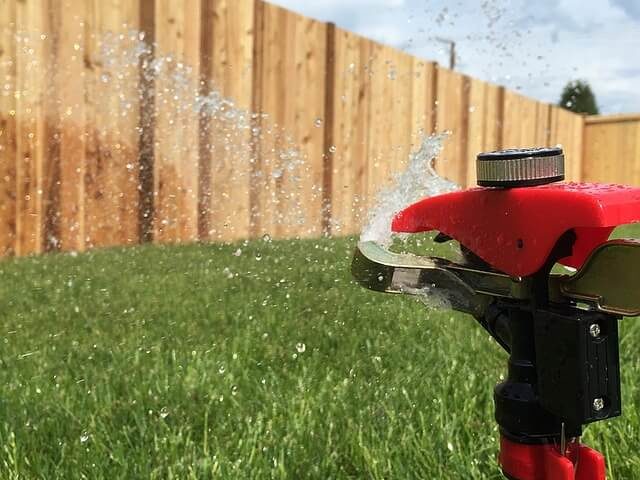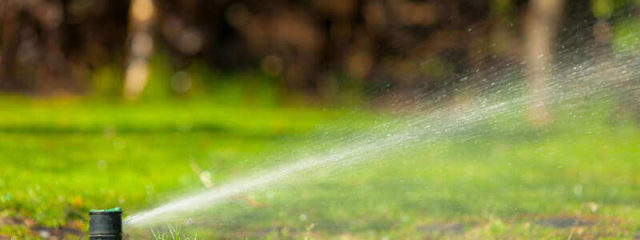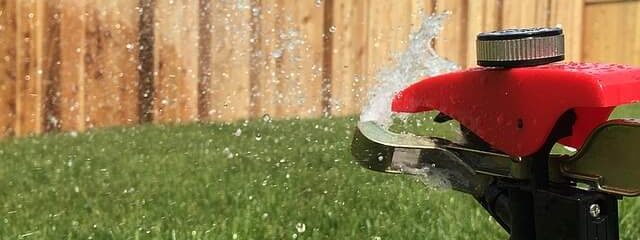The warmer months bring vital sunshine to your lawn, but could also potentially harm your grass if you are not properly watering your lawn. Luckily the experts from Senske have some helpful tips for watering your lawn to get the most out of the growing season.
There are many factors in caring for your lawn, including proper irrigation maintenance. Your sprinklers are your greatest asset in caring for your lawn. Use these helpful tips to get the most out of your sprinklers.
Tips for Watering Your Lawn
Be Consistent with Watering
No matter how committed you are to watering your grass, consistency is important. Without watering, grass will go dormant as it would during the winter. It wouldn’t be the end of your lawn, but don’t expect it to spring to life in the summer. If there is an expected drought it would be strongly recommended to water. The best thing to do is to consistently water to a set schedule, not letting your grass go into a state of dormancy. Flipping back and forth between dormancy and activity will stress your grass, doing more harm than good.
Don’t Water More Than Twice a Week
One of the most common watering mistakes property owners make is watering their yard too often. The truth is, most lawns don’t need to be watered more than twice a week. There are some exceptions, however; sandy soil needs water every three days, and clay soils only once a week. Over-watering can actually cause more damage than you would think. Grass only needs about an inch each week. Too much water contributes to detrimental fungal growth or encouraging shallow roots.
Morning is the Best Time to Water
The best time to water your lawn is in the morning. Climate conditions are preferable in the morning because there is less heat or wind that could prevent water from reaching your grassroots. The heat of the day could evaporate water before it can soak into the soil, and nighttime watering lets water sit too long. Standing water or oversaturation could increase the risk of lawn diseases. The absolute best time is a window between 4 a.m. to 10 a.m.
Let Water Soak In
Heavily compacted soil makes it difficult for water to find its way to the roots of your grass. This is especially true in new housing developments that sit on newly compacted soil caused by construction traffic. To soften up the topsoil, try watering in intervals. Water your grass for 30 minutes, let it rest, then water again for 30 minutes. If you water on the hard soil the moisture will likely run off without soaking in.
Loosen Up the Soil
Ideally, you want to allow water to soak in the soil about 6 inches down. A healthy grassroots system is about 6 inches deep. When first loosening up soil, check seepage every 15 minutes during watering. You can use a shovel to lift up dirt and see how damp it is within these 6 inches. Keep in mind that no two lawns are alike. It may be a good idea to research the soil in your area beforehand.
Pulsating Sprinklers vs Oscillating Sprinklers
Pulsating or oscillating sprinklers? Typically, you want to use pulsating sprinklers for older, more mature lawns. However, for new grass, oscillating sprinklers are the way to go. Oscillating sprinklers tend to be more gentle on young grass and freshly planted seeds. Until your grass has a chance to take root, using oscillating sprinklers are the best choice.
Get a Timer
We have established that watering consistency and avoiding overwatering are important factors in maintaining a healthy lawn. Keeping track of time is a must for meeting these goals. If you are like most people, chances are you have turned on your sprinklers left to go grab something inside, and completely forgot about your lawn. Setting a timer for your sprinkler system is the best thing you could do to save yourself the hassle of keeping track of watering. If your sprinklers aren’t automated, there are timing devices that attach to the hose that can regulate watering for you. Program your watering schedule and walk away!
Need Professional Help?
Do you need assistance with getting your sprinkler system fully operational? Do your sprinkler heads need maintenance? Senske technicians are experienced with a wide variety of sprinkler systems. If you need help with your irrigation start-up or maintenance, contact your local Senske technicians!




